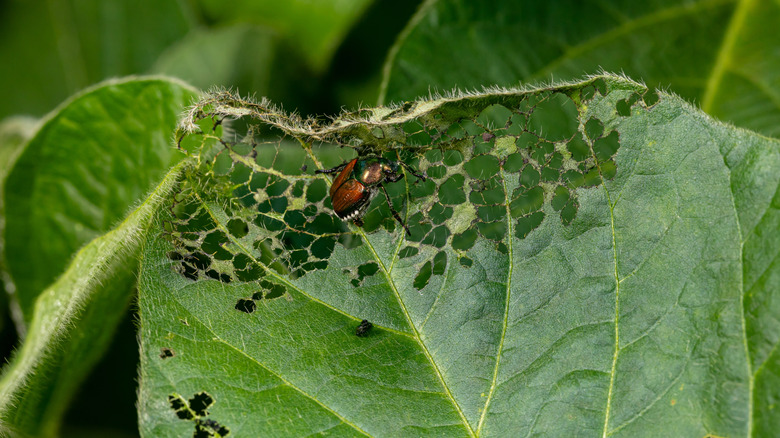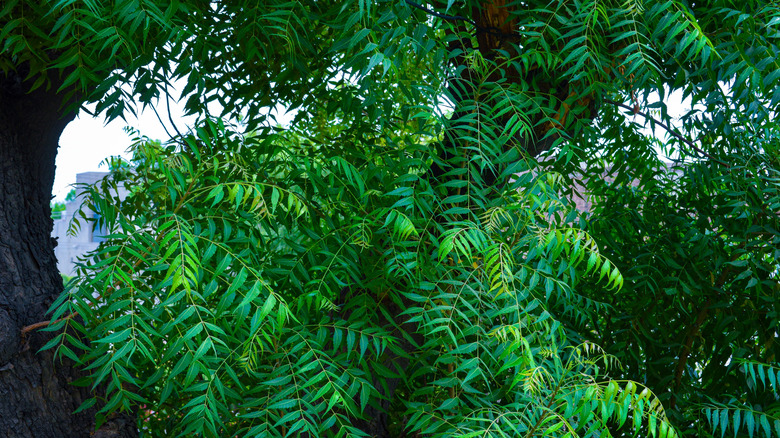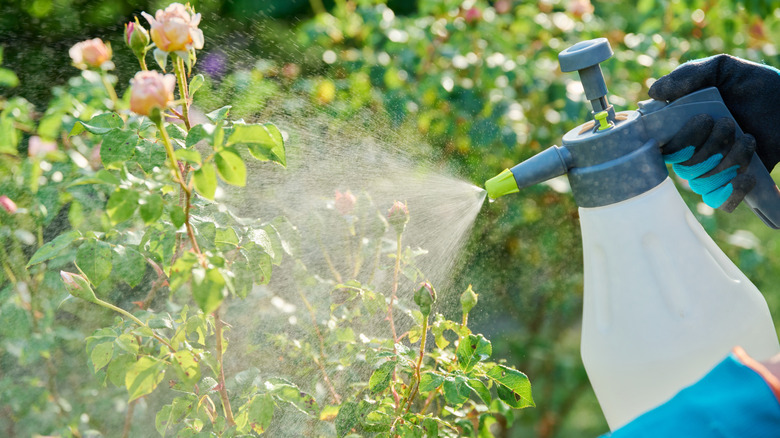Keep Japanese Beetles Out Of Your Garden Naturally With A Simple Oil Solution
Are your prized roses looking more like a lace doily than a healthy display of blooms? If so, you're probably battling an iridescent, leaf-chomping menace known as the Japanese beetle. These persistent pests can decimate a yard in what feels like days, leaving behind a trail of plant destruction and gardener frustration. While there are many ways to try and fight them off, from traps to various chemical treatments, or even by planting certain flowers known to deter them, many gardeners want gentler, more natural solutions that won't harm beneficial insects or the environment. Fortunately, there's a simple, oil-based answer that can help keep these unwanted garden guests from making a meal of your garden: neem oil.
This natural product of the neem tree offers a way to keep Japanese beetles away without using harsh chemicals. While effective for several days, repeat applications are necessary, and it tends to work best as a deterrent or when beetle populations are not overwhelmingly large. A significant benefit is its low risk to beneficial insects like bees, making it a garden-friendly alternative you can feel good about using.
The gentle power of neem oil against garden pests
Neem oil, extracted from the seeds of Azadirachta indica, or the neem tree, works as a botanical deterrent against a wide array of garden pests, including the destructive Japanese beetle. Here's how neem oil affects garden pests: Its effectiveness comes from azadirachtin, a naturally occurring compound that interferes with insect feeding and reproduction. When Japanese beetles land on plants that have been treated with neem oil, they become less inclined to munch. It also disrupts their normal growth cycles. The beetles may stop feeding, fail to mature, or struggle to reproduce, gradually reducing the population in your garden.
Neem oil also works on contact by suffocating soft-bodied insects, including Japanese beetles. It coats their bodies, blocking their breathing openings and effectively cutting off their air supply. This method is often responsible for the more immediate effects seen after spraying, while the azadirachtin works over a longer period. Other studies show that neem oil repels Japanese beetles, though the exact reasons behind this are unclear.
Applying neem oil isn't an immediate solution like some synthetic pesticides, but a more subtle, long-term approach that gradually cuts down on pest activity. It's especially useful when beetle numbers are more manageable, working as a preventative measure or to suppress smaller infestations before they explode into widespread destruction. What makes neem oil appealing to many gardeners is its reputation for being low risk to other insects like bees, ladybugs, and parasitic wasps, making it a garden-friendly option to deal with pests.
Applying neem oil for best results
Knowing how to use neem oil effectively against Japanese beetles involves the right preparation and consistent application. It can be purchased either as a concentrate, requiring mixing, or in convenient, ready-to-use spray bottles. If you're using a concentrated solution, it needs to be mixed with water and a small amount of mild liquid soap (as an emulsifier) before spraying. The soap helps the oil mix properly with water and stick to the plant surfaces. Always follow the product's specific mixing instructions, since concentrations can vary. For the best results, apply the mixture to the leaves of the affected plants, making sure to spray both the top and the underside of the leaves, where beetles often feed.
The best time to spray is during the cooler parts of the day, either early morning or late evening, to prevent leaf burn and to allow the mixture to dry before direct sunlight becomes too intense. While neem oil provides protection for several days, repeat applications are necessary, especially after rain or heavy dew, to maintain the best results. Consistency is important with neem oil. Regular treatments, typically every 7 to 14 days during periods of high Japanese beetle activity, will help keep populations down and protect your plants.


